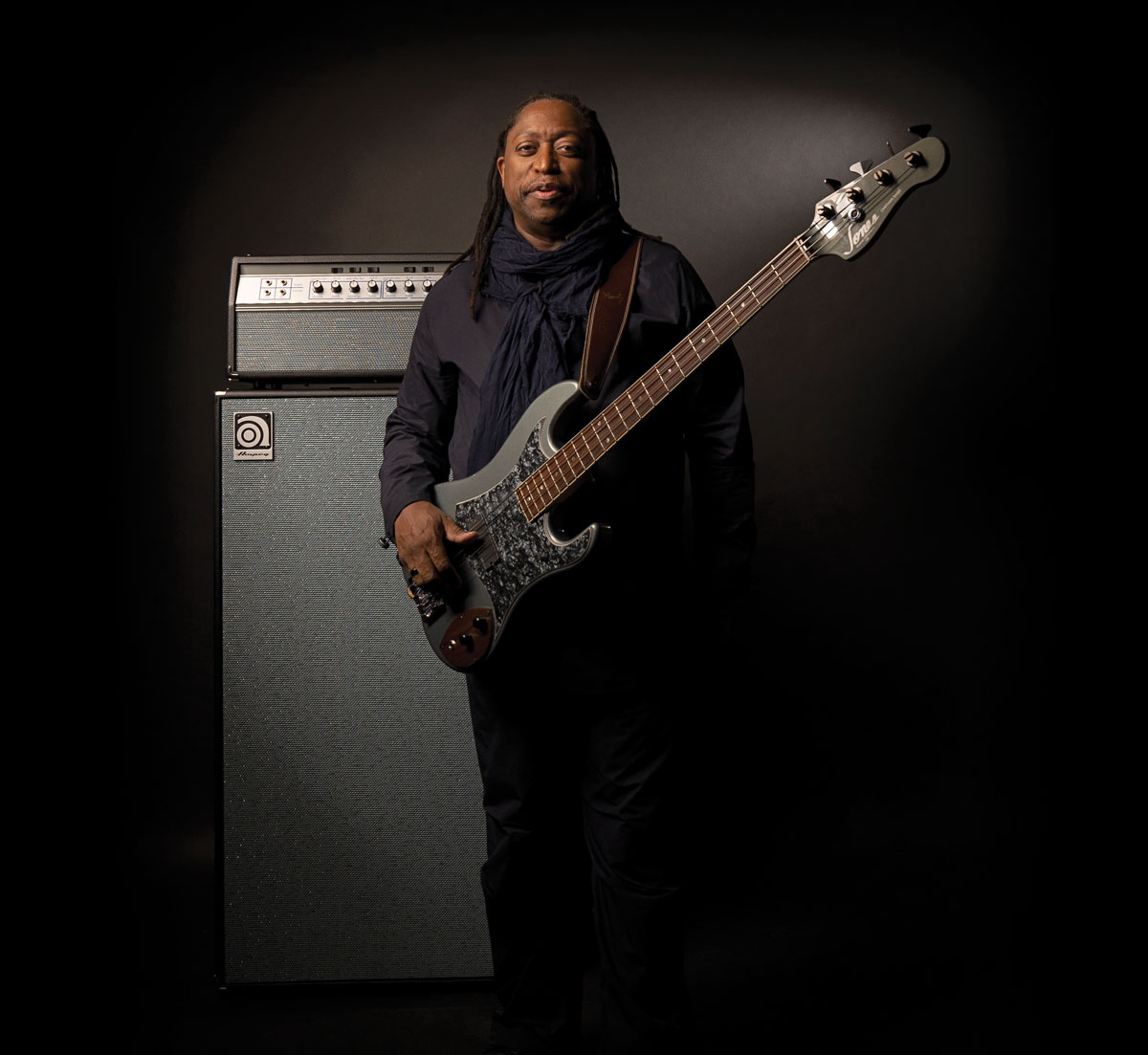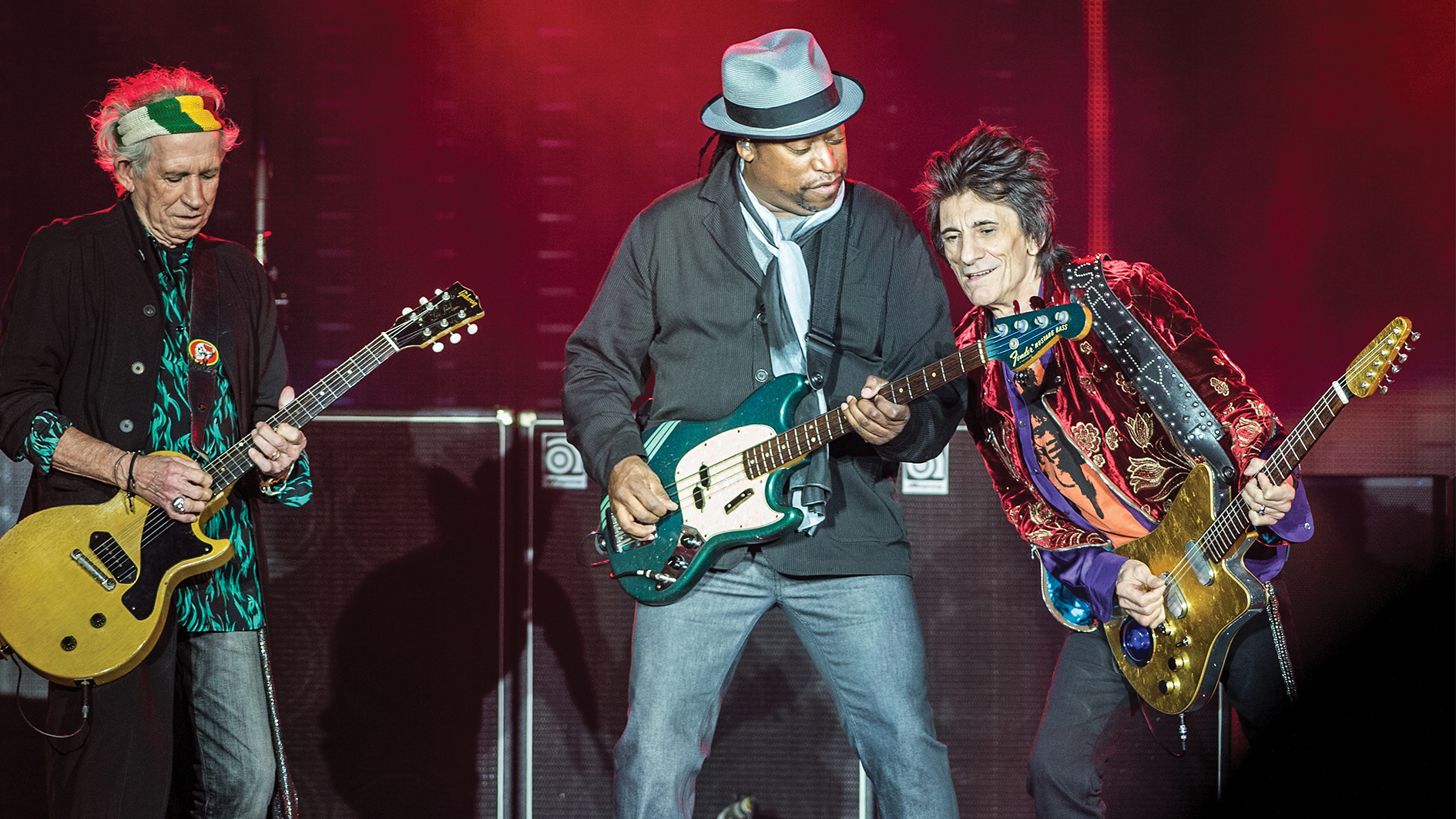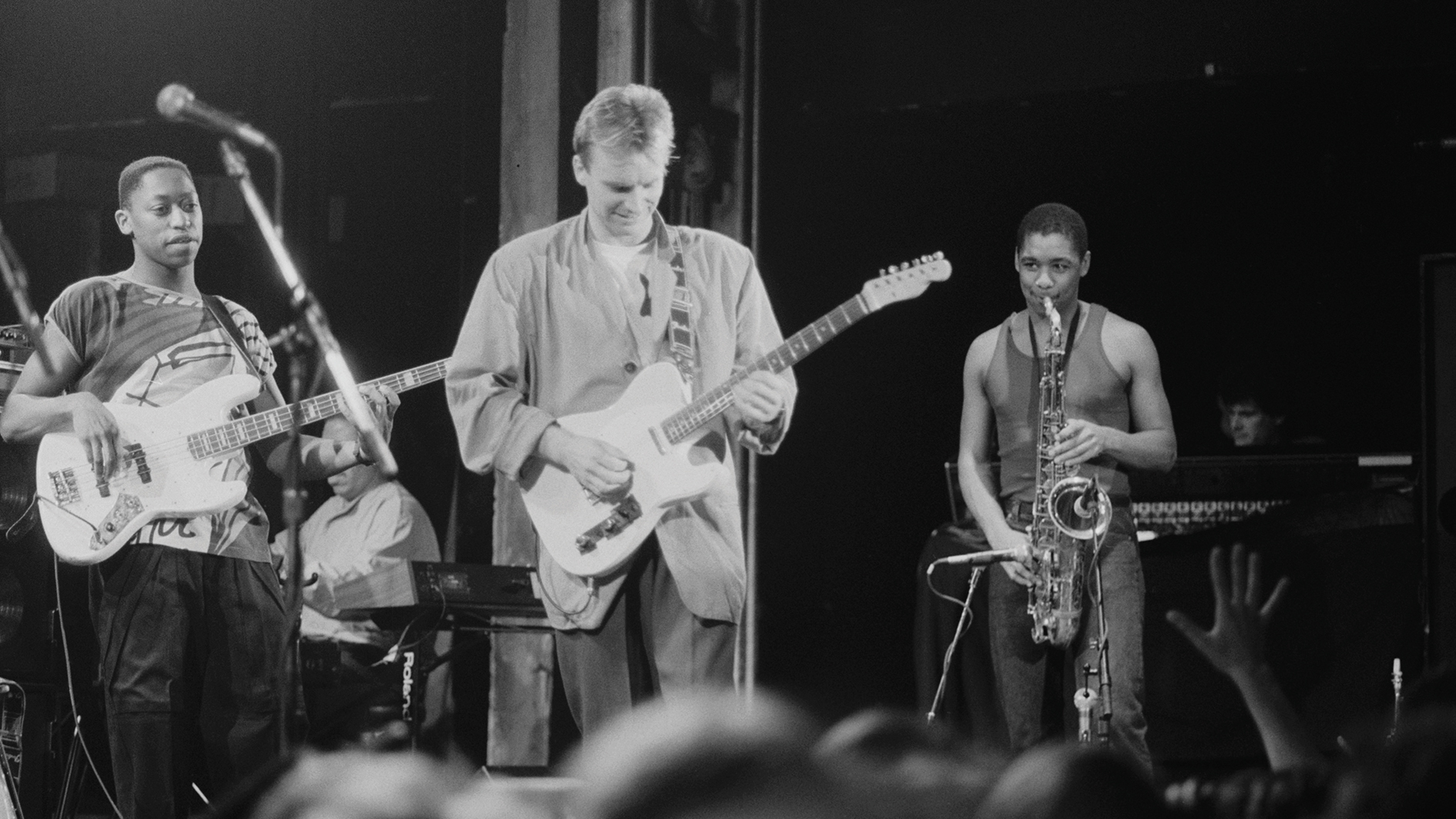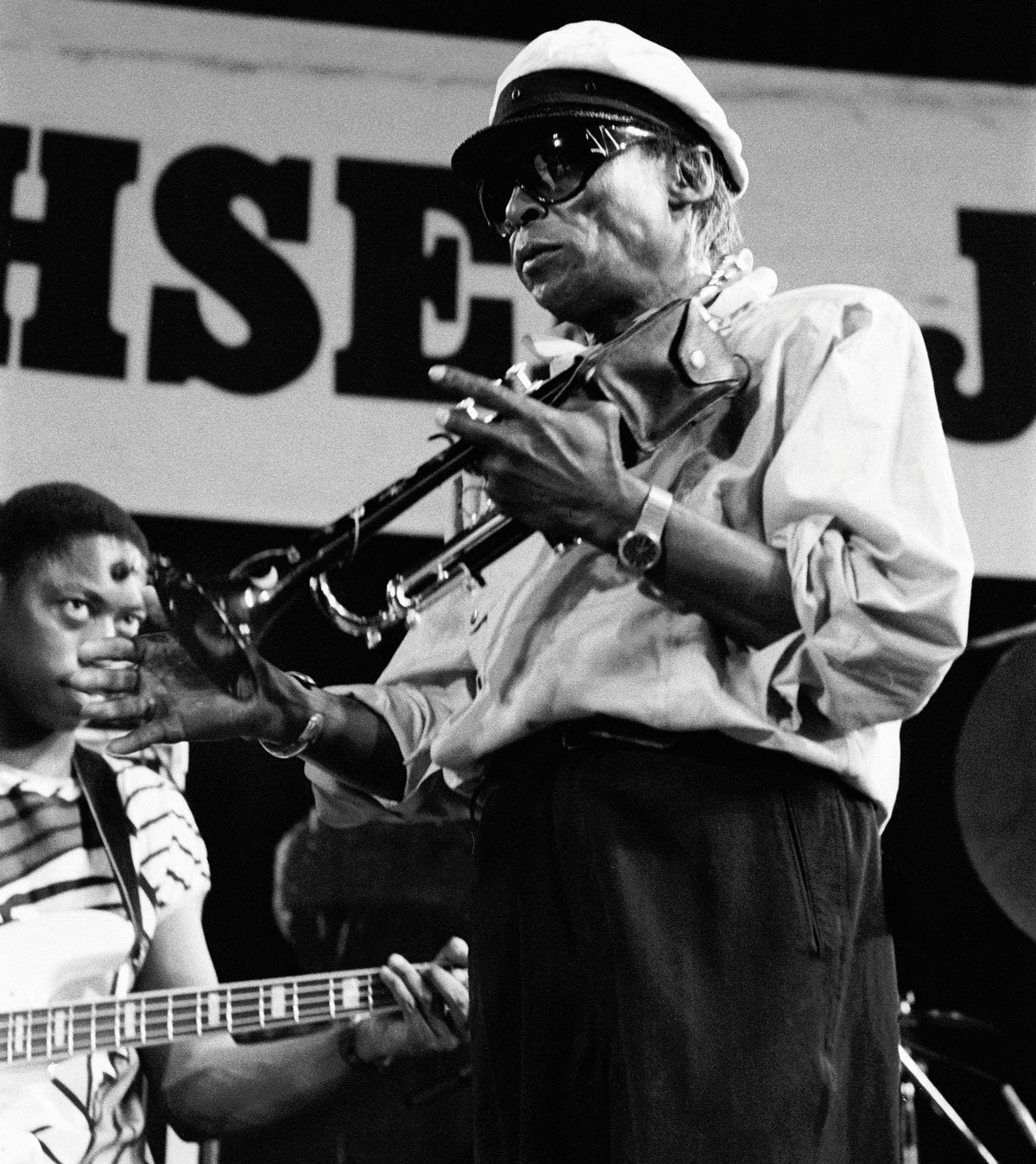Darryl Jones: "The Rolling Stones are pretty cool about letting me play what I want - they trust that I'll find the essence of the songs"
The in-demand bass player goes deep on nailing the Stones' tones, playing with Miles Davis and the luxuries of touring with one of the world's most commercially successful bands

We cover as much ground as possible in Bass Player when it comes to styles of music, and we feature up-and-coming bassists as much as megastars. It’s our job to lay accolades at the feet of bass players from the jazz, soul, pop, blues and funk worlds just as much as players who specialize in plain old rock, and we’re not easily impressed by sales figures.
With all that in mind, though, even we have to admit to blown minds at the sheer stature of the Rolling Stones. You may, or may not, regard them as innovators in their field; you may feel that their best days are long behind them.
These are arguable viewpoints, but two essential elements are not open to debate: 1) the Rolling Stones are still a massive commercial presence in 2020, selling out stadiums worldwide without new music to sell; 2) their bassist since 1993, Darryl Jones, is himself a force of nature, with a stage and session career that is second to none.
Jones is a deeply serious fellow when asked about the nuts and bolts of his trade, but one who dissolves into laughter when recalling the more ‘unorthodox’ of his former employers (we’re looking at you, M. Davis).
He has enjoyed a gold-standard few decades among the low frequencies. Born in Chicago in 1961, he made his bones with the aforementioned Miles at the age of only 21.
After two albums with the mercurial jazz icon, he joined Sting’s all-star band for the Dream Of The Blue Turtles album in 1985, subsequently playing with Herbie Hancock, Madonna, Eric Clapton, the Headhunters, Peter Gabriel, and many more stellar artists.
Jones’s full-time gig since 1993, however, has been with the Rolling Stones, taking Bill Wyman’s place when the long-time bassist stepped aside. As Wyman had been a Stone for 31 years at that point, arithmetic reveals that Jones is only five years away from equalling his predecessor’s tenure alongside Mick Jagger (vocals), Keith Richards, and Ronnie Wood (guitars), and Charlie Watts (drums), like you didn’t know the line-up already.
Get The Pick Newsletter
All the latest guitar news, interviews, lessons, reviews, deals and more, direct to your inbox!
I don’t know exactly how [Eric Hamburg] got onto me or my career, but he said that he’d like to do a documentary
Little wonder, then, that sitting down for a chat with Jones is quite an experience. Note that this interview took place before the current pandemic was announced, so some (or all) of his plans may have changed - but even so, what a musician, and what a privilege.
What do you do when you’re not playing with the Rolling Stones, Darryl?
"Well, I’m spending some time on a documentary about me, Like A Rolling Stone, that has been in production for the last couple of years. I’m working on the score for that right now. I’m always doing a little bit here, a little bit there.
"I just recorded with Bill Evans, Robben Ford, and Keith Carlock for a record that is going to be released."
Tell us about the documentary.
"A filmmaker called Eric Hamburg, who was a co-producer on two Oliver Stone films, Nixon and Any Given Sunday, came to me a few years ago and told me that there should be a documentary about me.
"His original idea was a feature-length musicians’ film in a similar way that Any Given Sunday was about the inner life of football players. I don’t know exactly how he got onto me or my career, but he said that he’d like to do a documentary, and we’ve been working on it for the past three years, doing interviews with the Rolling Stones and other musicians that I’ve worked with.
"We’ve shot a couple of gigs of music that I wrote, some of which I’m singing on, and
we’re finishing up Act Three and getting this thing out.
"As well as all that, I’m always working on trying to stay healthy and get into good shape for the Stones tour that’s coming up in a couple of months. So yeah, life keeps me busy enough."

Is a Stones tour a physically demanding exercise?
"Not physically, no. It’s pretty cushy as far as touring goes. They don’t do a lot of gigs, they don’t do gigs back to back, and the travel and the hotels are all very nicely organized, so it’s not a tough tour in that regard. There are certain things that are difficult, like being away from home and trying to eat right and stuff like that, but I’ve figured out my way to do that.
"I make a dash for a good health-food store when I get to a town, and get a few supplies, and I’m learning more and more about health and what works for me. So, no, it’s not difficult."
What gear do you take out with the Stones?
"I use the Stones’ old 1970s Ampeg SVT head as well as going back and forth with some newer SVTs, and I always use two SVT cabs. In addition to that, I’ve been using QSC gear, some of their K.2 series - the 18” subwoofer, and the K.12.2 cabs.
"Also, I got onto a couple of the Jonas Hellborg preamps that he did for Warwick a number of years ago: I’ve been using that to run in front of the QSC gear."
Jonas is a guru of bass amplification.
The sound of an SVT for rock’n’roll - it’s hard to beat that
"Yes, he’s very well versed in that stuff. When I went over there, he told me that he had acquired a Neve board a few years before and had it shipped to his home in Sweden. After he got it he realized that no-one knew how to repair it, so he basically learned how to repair it himself.
"His preamp comes from some of the knowledge that he gained from that, because it does sound very warm and natural, like a Neve channel. Anyway, the QSC gear is there for me to have a little bit more horsepower on stage, and the SVT is what is being recorded and what is basically going out from the bass, along with a direct signal, out to the front of house."
It’s a classic bass tone.
"The sound of an SVT for rock ’n’ roll - it’s hard to beat that. That stuff has been part of the Stones’ repertoire for years. I’ve been using them almost 20 years now. When Dave Natale came on board as the soundman, he said that he’d found it to be a really great sound for rock ’n’ roll.
"The guys then said ‘We have an old SVT’, and they have great people who keep them working really good. They have a tube guy who looks at all the tube gear on stage and keeps it working great. So it’s been either that or a newer head in terms of amplification."

Do you use in-ears for monitoring?
"I do use in-ears, but the one thing that they lack is the feeling of air moving behind you, which I really like to have. It’s just one of those things that makes me feel a little more comfortable. Now, Keith, Ronnie and Charlie do not use in-ears, and I want them to hear what I’m doing, which is why I’ve used both systems for a number of years."
Presumably, whatever gear you need, there is the budget to get it and the staff to maintain it?
"That is, absolutely, a luxury of playing with this band."
You don’t have to carry your own amp, I assume.
My carrying gear days are mostly behind me, hopefully...
"Not with them, no. I still work with some people who don’t tour quite as luxuriously as the Stones do, so I’m not all the way out of that. I think my carrying gear days are mostly behind me, hopefully. On a lot of the smaller gigs I do, particularly the electric jazz gigs, I use the QSC stuff, a couple of K.8.2 cabs, the smaller speakers."
What bass guitars do you take out with the Stones?
"I take a number of them out. For songs from the early 60s going into the 70s, I use some chambered instruments. I use a Fritz Brothers bass. They did a copy of the old Kay electric bass that’s chambered - so it’s hollow but it doesn’t have any holes. It has a single lipstick-type pickup and it’s really great for the early stuff, if you use a pick to get that kind of edgy, almost mod bass sound.
"I also use a Fender Mustang, which is funny because I grew up playing one of those, when I was very young. I ran into one in a shop that was the exact same color as the one I played when I was a kid, and it was in really great shape, so I asked them to hold it for me because it was literally the bass of my childhood.
"I pulled it out and started playing it a little bit on some of the Stones’ stuff and it sounded incredible."
Where does the Mustang tone fit in?
"That’s for songs like Start Me Up and (I Can’t Get No) Satisfaction, and it sounds great, played with flat-wound strings and a pick. People are now starting to get hip to the fact that short-scale basses have a very distinctive sound, I guess because of the string tension.
"What else am I using? I have a new Gretsch Thunder Jet bass, and I use a Music Man Stingray on the two or three Stones songs where a fretless is needed."
You’re also running a guitar company, Jones Musical Instruments.
"I’m really at the early stages, you know. I’ve got a Precision-style bass, which is called the Chatham bass, because I grew up in an area in the south side of Chicago called West Chatham, and a Jazz bass I call my Gresham bass, after a neighborhood that’s just near where I grew up.
I can’t think of any song that I really try to play exactly like Bill [Wyman] played, you know
"I play the Chatham bass on Miss You and in the little area in that song where I feature. I also use Laklands on a few tunes. I think that’s about it for now. It’s probably four to six instruments on a gig."
When you joined the Stones in 1993, did you play Bill Wyman’s bass parts as he had recorded them, or did you add your own spin?
"You know, an interesting thing happened there. Before the audition, I went out and bought a bunch of Stones Greatest Hits records and started trying to figure out some basslines. That really showed me, even before the audition, that there was no way I was really gonna be able to learn these basslines verbatim.
"But there are certain things that Bill and whoever was playing bass - Keith was on a bunch of it, Ronnie’s on some of it - did, that really are parts of songs.
"I try to cover those things, but I can’t think of any song that I really try to play exactly like Bill played, you know."

Do the other Stones have strong views about that?
"At one rehearsal, I figured out what Bill had played on Respectable, and I started playing it, and Mick was like 'Where are you going?’ I said, ‘Well, this is what Bill played on the song’ and he said ‘No no, don’t play that. Play what you hear.’
"So neither I nor they are that precious about that stuff. The first time I rehearsed with them, I asked Keith, ‘Hey man, did you play bass on this song?’ and he said ‘Yeah’. I said ‘So what’s the bassline?’ and he was like, ‘I don’t know, man. You’re the bass player, you tell me what the bassline is!’
"Haha! So they’re pretty cool about letting me do what I want. I still want to play the essence of the song. If there’s something in the essence of the bassline that needs to be played to make the song what it is, they seem pretty trusting of me that I’ll find those things. The rest they leave to me, basically."
Some parts are very recognizable - the giant slide at the end of 19th Nervous Breakdown, for example.
They’re pretty cool about letting me do what I want. I still want to play the essence of the song.
"Oh yeah! That’s a lot of fun to play, and that’s why I use all the different instruments. The Fritz Brothers bass is great for playing that mids tone on She’s So Cold, with a pick tone on flatwounds. I use that for anything that sounds that way on record from that period.
"If you listen to what Bill was playing in 1985, then you’re talking about roundwound strings, maybe on a Steinberger, so I try to choose the right bass. If it’s a more modern sound, then I’ll use one of the Jones instruments."
Have you experienced any physical issues after so long playing bass?
"Not very much, man. I will say that there are a few moves that I do with my fingers that I look at now from the position of ‘Is barring that way, and playing that first note with your finger, is that sustainable?’ Ha ha! I think ‘Maybe I need to find a better way to play that stuff...’
"But I’ve been very lucky. I haven’t had many back issues, I’ve not had many issues with my hands. It’s just about getting older and understanding that a joint might be a little bit sore after playing something, and how I can find another way to do it that is less demanding on joints and fingers."
Lee Sklar talks about a healthy lifestyle being paramount for a sustained career as a bass player.
"Absolutely, and that doesn’t surprise me. You know, whenever I see Lee and talk to him, he always seems so very, very positive and happy. He’s got a great sense of humor and he seems to be an easy-going guy. He’s got his own flow, and of course he’s an incredible musician."
[Miles Davis] would say ‘You know the bass-line you play on such-and-such a song? Don’t play that any more. Find something else!
You recorded Decoy (1984) and You’re Under Arrest (’85) with Miles Davis. Was he directive about the bass parts, or did he welcome your ideas?
"Both. Miles trusted musicians more than his reputation would lead people to believe. He would let you in and allow you to try stuff, and then from the stuff that you tried, he would single parts out and say ‘Okay, I want to hear more of that’.
"Every once in a while he’d say ‘Play this’, but he’d never play the same thing twice, which always led to a certain built-in amount of variation into what was going on.
"The other thing that he would do, after you’d been playing that for a few months, was to say ‘You know the bass-line you play on such-and-such a song? Don’t play that any more. Find something else!’ You’d think ‘Shit. It took me weeks to figure out what was working with that song’. But that was his way of pushing you to come up with new ideas and a different approach."

So he kept you on your toes?
"Yeah. One of the first songs I recorded with Miles was the song ‘Decoy’, and at first I was playing that bassline with my fingers. We rehearsed it that way, but right before we recorded it he turns to me and says ‘Darryl, thump it!’ and I said ‘Which part?’ He said [gravelly whisper] ‘All of it!’
"So that was a situation where he asked me to do something that I really wasn’t sure I could do - but I just did it. Listening back to that record now, I’m thinking to myself, ‘Why would I have ever thought to do it any differently than what he recommended?’ It’s one of the parts that I’m most proud of."
Did the bass parts also vary when you played them live?
[Miles Davis] trusted me enough to say ‘If you think it works that well, then go ahead and play it’. That’s vindication, right there
"Every night he’d listen to the gig after the show. If you came up with something that he thought was cool, the phone would ring at three or four o’clock in the morning and say, [subterranean rasp] ‘You know what you played on such-and-such a song? I want you to play that every night’. He was always listening.
"There was one time when he told me to change a bass-line and I thought to myself, ‘You know - he’s wrong about this’ and over a few weeks, I slowly went back to my old bassline. And one day, on stage, he just looked at me and said ‘Well, goddamn! If you just have to play that bass-line, go ahead!’ He was letting me know that he was listening to what I was playing.
"But he trusted me enough to say ‘If you think it works that well, then go ahead and play it.’ That’s vindication, right there."
Joel McIver was the Editor of Bass Player magazine from 2018 to 2022, having spent six years before that editing Bass Guitar magazine. A journalist with 25 years' experience in the music field, he's also the author of 35 books, a couple of bestsellers among them. He regularly appears on podcasts, radio and TV.
“I asked him to get me four bass strings because I only had a $29 guitar from Sears”: Bootsy Collins is one of the all-time bass greats, but he started out on guitar. Here’s the sole reason why he switched
“I got that bass for $50 off this coke dealer. I don’t know what Jaco did to it, but he totally messed up the insides!” How Cro-Mags’ Harley Flanagan went from buying a Jaco Pastorius bass on the street to fronting one of hardcore’s most influential bands





![John Mayer and Bob Weir [left] of Dead & Company photographed against a grey background. Mayer wears a blue overshirt and has his signature Silver Sky on his shoulder. Weir wears grey and a bolo tie.](https://cdn.mos.cms.futurecdn.net/C6niSAybzVCHoYcpJ8ZZgE.jpg)

![A black-and-white action shot of Sergeant Thunderhoof perform live: [from left] Mark Sayer, Dan Flitcroft, Jim Camp and Josh Gallop](https://cdn.mos.cms.futurecdn.net/am3UhJbsxAE239XRRZ8zC8.jpg)






